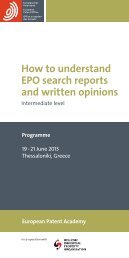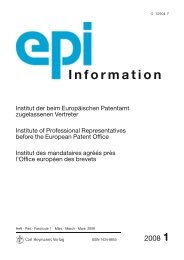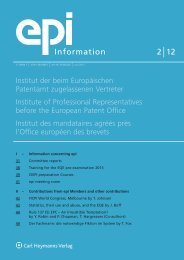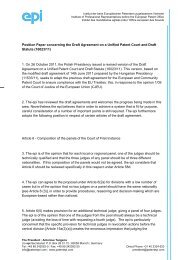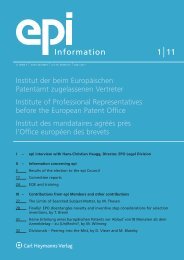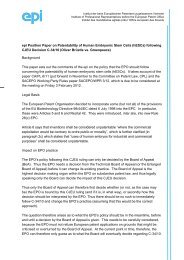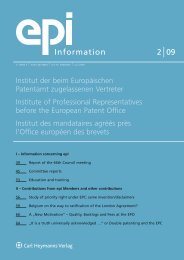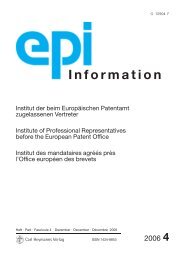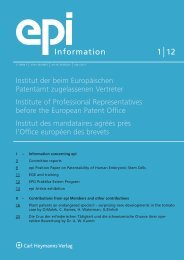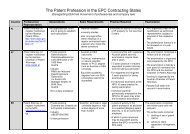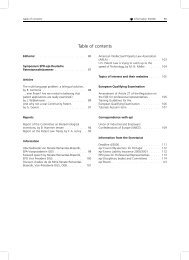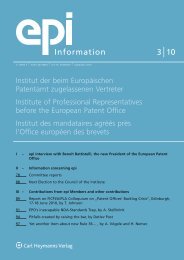116 125 th Administrative Council meeting <strong>Information</strong> 4/<strong>2010</strong>discussions. This is what defines my role in the Board,too. I have to take part in setting agendas and ensuringsmooth collaboration between the Committee and theCouncil. I am convinced that the Board is a good forumfor achieving these goals and that its establishment wasan excellent idea.2. Users are concerned about the time scale/limits forfiling divisional applications. How does the committeereact to these criticisms from users?Allow me to start by making two general, almost „philosophical“,remarks.The first concerns the speed or frequency with whichrules can be changed. If a norm is not stable enough, it isno longer a norm. What makes a rule a rule is its stability.If it is applied only once or for an exceptionally shortperiod of time, it loses its general nature. If you keepchanging a norm, you will end up having no normwhatsoever. Therefore, stability seems an inherentquality of all, legal and non-legal, norms governinghuman life and society. This is all the more so in the fieldof patents where long-term business decisions areusually required. Stability of the legal framework is anessential part of the legal certainty much needed forinnovation and developing patenting strategies withlong-term effects.My second general remark would be that one shouldnot stick to an overly narrow interpretation of the concept„user of the patent system“. It is not only theapplicants’ or the professional representatives’ intereststhat the decision-makers of this Organisation mustproperly take into account and weigh. By definition,the interests of those who have to respect the exclusiverights conferred by patents are not articulated in thesame organised manner as those of the biggest applicants.It is the duty of the national governments representedin the EPO’s bodies to ensure that all interests thatare at stake be taken into account before importantdecisions are made. I am a great supporter of open andthorough consultations with the so-called „stakeholders“.Consultations do indeed contribute to improvingthe quality of legislative drafts. From the more anglesa legislative proposal is looked at and examined, thebetter its quality can be. In addition, consultations arealso useful for properly assessing the interests of thosepotentially affected by any new provisions. However,views expressed in consultations cannot be regarded asmandatory instructions addressed to decision-makers.The latter have to listen to all sorts of users but they willnot always necessarily act as they are told by thoseconsulted. They are under an obligation to consider allthe interests at stake.I do understand that the new regime for filing voluntarydivisional applications is a source of concern to anumber of users. Since discussions started on this issue ithas been a controversial one, I might even risk sayingthat an exceptionally hotly debated one. When, in March2009, the Council finally took a decision on the relevantamendments to the Implementing Regulations, it wasfully conscious of these controversies and the complexityof the matter. The Council had to strike a balancebetween a number of different, and sometimes evenconflicting, interests. Inaction did not seem to be anoption. The main concern was to prevent a distortion ofthe system and to stop dysfunctional practices, whichwere criticised by, among others, the European Commissionin its report on the pharmaceutical sector inquiry.As you may recall, the main objectives of revising thelegal framework for divisionals were basically the following:ensuring and strengthening legal certainty,especially for third parties; increasing procedural efficiencyand avoiding unnecessary delays in the grantingprocedure; and assisting the Office in coping with its everincreasing workload. It was, however, acknowledgedthat there was also a need to provide fair treatment for„legitimate“ voluntary divisional applications and toensure that their room of manoeuvre should not beunduly limited.Obviously, due to the changes to the legal frameworkfor divisionals, certain stakeholders of the patent systemhave had to adapt their previous behaviour to the newregime. But that is normal. In fact, changing behavioursis just exactly what changing the law is all about. What isthe point in changing the law if it results in no changewhatsoever to the actual practice?As all new pieces of legislation, the new rules ondivisionals will have to be revisited. A review of thecurrent legal framework will certainly be called for in themedium term. But for such a review to make real sense,we would need a sufficient amount of experience. Someusers are naturally concerned about the new regime butthis should not lead the EPO bodies to arrive at prematureconclusions or take action hastily. The legalframework for divisionals might need further improving.For instance, we have to make sure that, due to theinterplay between the new rules and some others,applicants should not loose their right to claim subjectmatterthey have previously disclosed in an earlierapplication. But first, we have to clearly identify theproblems occurring in the application of the new regime.This takes time. So does finding solutions.As announced at the last meeting of the Committeeon Patent Law, in early December <strong>2010</strong>, the Office willhold a brainstorming meeting with users’ representativeswith a view to drawing up a list of areas where furtherrule changes might appear necessary. I do believe that aneven more structured, intensified dialogue with usersmay further improve the legal environment of patentingin Europe.3. The EPO published a notice on the 39th meeting ofthe CPL regarding proposed amendments of Rules36, 161, 162, 71 and 71a and the unanimouslyfavorable opinion of the CPL of the proposedamendments – is this a sign of more transparencyin the working of the AC and its bodies?Yes. This is a sign of even more transparency. Not that theCommittee would have had thus far any serious transparencydeficit. I have been chairing its meetings formore than five years and I am unable to recall anymeeting where we would have had any confidentialitems. Not a single one. No information is withheld from
<strong>Information</strong> 4/<strong>2010</strong> 125 th Administrative Council meeting 117users or the general public. But, of course, furtherimprovements can be achieved in that regard, too, andthe notice you have referred to is certainly one of them.4. Is your committee concerned about the differencesin approach of the USPTO and the EPO in respect ofbusiness method patents, which differences couldbe said to lead to impediments of the developmentof European industry?The Committee on Patent Law has not specificallyaddressed this issue. Not even in the framework ofdiscussions on substantive patent law harmonisation,as the issue of the technical character of patentableinventions does not form part of the so-called reducedpackage currently discussed within Group B+. Therefore,I am not in a position to say anything specific on this, noteven on the assumption implied in your question.In addition, it is difficult to envisage, in the short term,an objective debate in Europe on an issue like this afterthe negotiations on, and the eventual failure of, theproposed Directive on computer-implemented inventions.If adopted, that Directive would have confirmedthe established law under Article 52 EPC, namely thatbusiness methods as such are not to be regarded asinventions that can be patented.In general, I can however subscribe to the view thatpatent law issues should not be examined in isolationfrom economic, social or ethical considerations. Prior tointroducing legislative changes, it would always have tobe checked whether they in fact contribute to increasingEurope’s competitiveness on the global market. In thatrespect, nothing should be taken for granted. On theother hand, none of the current bodies of the EPO’sAdministrative Council take primary responsibility forlooking into the economic impact of patent law andpractice. The Committee on Patent Law has no explicitcompetence for that and its current composition wouldnot be optimal for that purpose, either. Even the Budgetand Finance Committee is only concerned about thefinances and the budget of the Organisation itself. Soperhaps there is some room for institutional improvementin that regard.5. Will the new guidelines for examiners be madeavailable for users?The Committee on Patent Law does not normally discussthe Guidelines for Examination or changes to them.Nevertheless, as far as I know, the Guidelines are in factpublicly available, for instance on the Office’s website. Ifyour question is aimed at the so-called internal instructionsand the availability thereof, I can only rely on theinformation I have received from the Office. They havelaunched a project for incorporating the internal instructionsinto the Guidelines. This is how they will eventuallybecome publicly accessible. There will no longer be twoseparate sets of instructions to examiners – a publiclyavailable one and another for internal use only –, butthese will be integrated into a single, publicly accessibledocument called Guidelines.6. The <strong>epi</strong> submits numerous position papers on patentlaw developments. Do you see these as a help orhindrance?As a help, of course. I personally benefit a great deal fromthe <strong>epi</strong>’s position papers in preparing for the meetings ofthe Committee. Hungary’s national delegation regularlyconsults the Hungarian members of <strong>epi</strong> before CPLmeetings. This kind of professional dialogue is invaluable.Interview with Josef Kratochvíl (CZ)Chairman of the Technical and Operational Support Committee (TOSC)of the Administrative CouncilIn general openingremarks Mr Kratochvilsaid that he welcomedthe ITaudit commissionedby the President.All Member States participatein the TOSC deliberations.The Committee’sbasic task is to advise theAdministrative Council onmatters listed in the TOSCmandate. Among others,quality of examiners workhave to play a key roleonce discussing possibilities of reusing the work alreadydone by other patent granting authorities.Replies to the <strong>epi</strong>’s questionsby Josef Kratochvílin his capacity as Chair of the Technical and OperationalSupport Committee1. How do you see your committee interacting with thework of the Administrative Council (AC) as a whole,and the NPOs?The Technical and Operational Support Committee(TOSC) was established after a thorough debate in theCouncil that had been running since 2008. The need ofwider mandate for the former WPTI has emerged from



